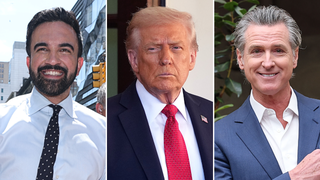The Washington Post has authenticated thousands of emails from Hunter Biden's laptop after the paper joined other outlets in downplaying and disparaging the New York Post's reporting during the 2020 presidential election.
The Washington Post published a lengthy report on Wednesday about Hunter Biden's "multimillion-dollar" financial ties to the Chinese energy company CEFC China Energy.
"Over the course of 14 months, the Chinese energy conglomerate and its executives paid $4.8 million to entities controlled by Hunter Biden and his uncle, according to government records, court documents and newly disclosed bank statements, as well as emails contained on a copy of a laptop hard drive that purportedly once belonged to Hunter Biden," the Post reported, before writing that it found no evidence that President Biden "personally benefited from or knew details about the transactions with CEFC" which all took place after he left office as vice president.
The Washington Post then addressed Hunter Biden's laptop, which was one of several sources on which the report was based.
MSNBC HOST CLAIMS ‘HUNTER BIDEN STORY’ IN 2020 WAS ‘FACT-CHECKED’ AND DEEMED MOSTLY ‘NONSENSE’
"The Post review draws in part on an analysis of a copy said to be of the hard drive of a laptop computer that Hunter Biden purportedly dropped off at a Delaware repair shop and never came to collect. The laptop was turned over to the FBI in December 2019, according to documents reviewed by The Post, and a copy of the drive was obtained by Rudy Giuliani and other advisers to then-President Donald Trump a few months before the 2020 election," the Post reported. "After the New York Post began publishing reports on the contents of the laptop in October 2020, The Washington Post repeatedly asked Giuliani and Republican strategist Stephen K. Bannon for a copy of the data to review before the election, but the requests were rebuffed or ignored."
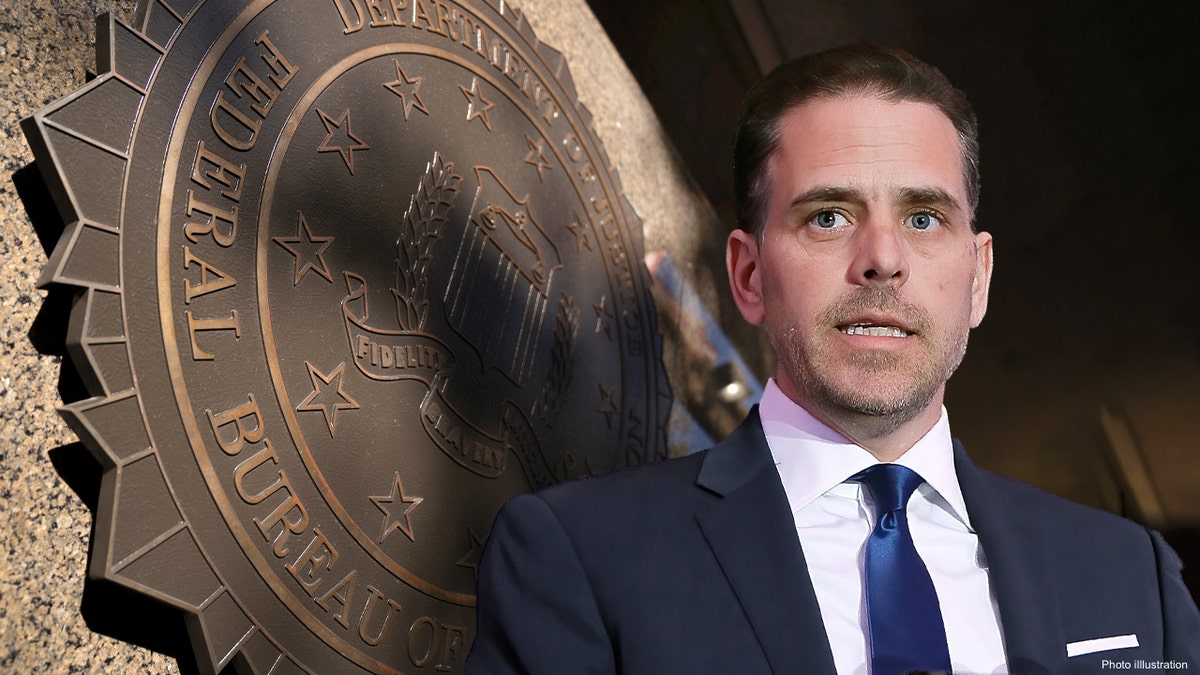
Photo credit: Getty Images
In a separate report explaining how The Washington Post analyzed Hunter Biden's laptop, the Post wrote, ‘Thousands of emails purportedly from the laptop computer of Hunter Biden, President Biden’s son, are authentic communications that can be verified through cryptographic signatures from Google and other technology companies," according to two security experts.
"The vast majority of the data — and most of the nearly 129,000 emails it contained — could not be verified by either of the two security experts who reviewed the data for The Post. Neither found clear evidence of tampering in their examinations, but some of the records that might have helped verify contents were not available for analysis, they said," the paper went on.
The latest reporting from The Washington Post comes days after The New York Times released its own bombshell report which also authenticated Hunter Biden's laptop.
In the run-up to the 2020 presidential election, The Washington Post largely kept its readers in the dark as to the seriousness of the Hunter Biden scandal.
The Post first addressed the Biden controversy on Oct. 14, 2020, the day the New York Post broke its story, using a variation of the "Republicans pounce" trope to frame the story, running the headline, "Three weeks before Election Day, Trump allies go after Hunter — and Joe — Biden."
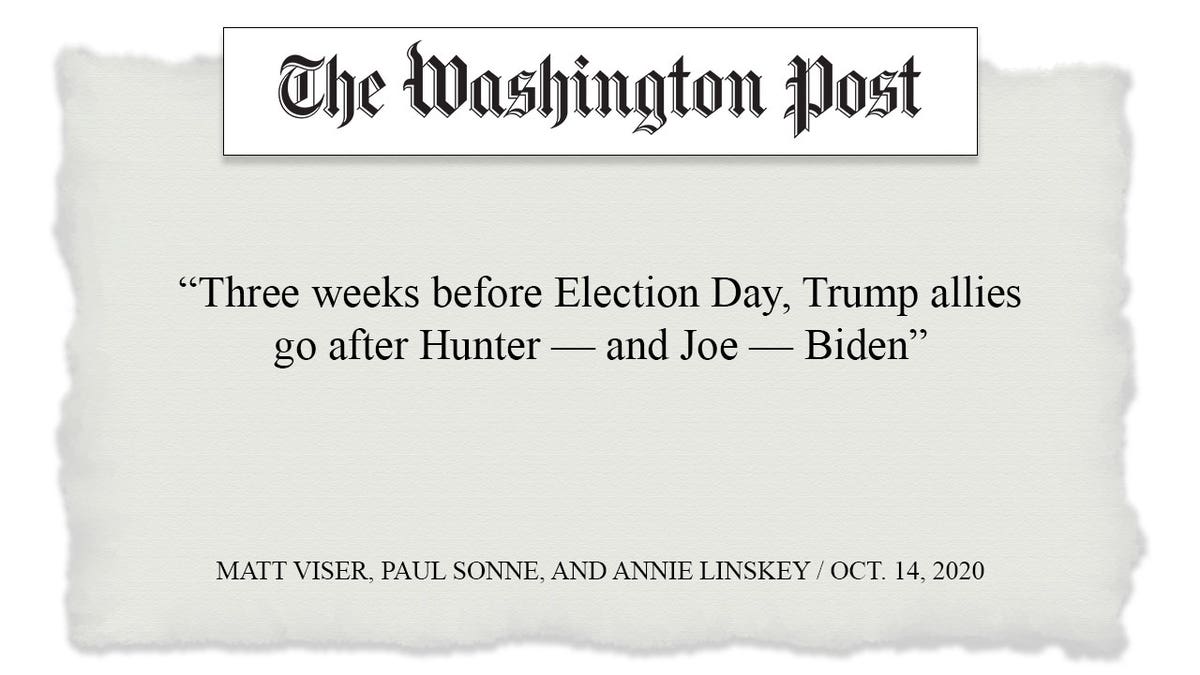
Right out of the gate, the report expressed heavy skepticism towards the legitimacy of Hunter Biden's emails and sowed doubt in the GOP sources who first obtained the laptop.
"President Trump’s personal attorney Rudolph W. Giuliani and his former top adviser Stephen K. Bannon, who have attracted the scrutiny of U.S. authorities for their political dealings in recent months, helped make public private materials purported to belong to Democratic presidential nominee Joe Biden’s son in an attempt to swing support to the struggling incumbent," the Post wrote. "The Washington Post was unable to verify the authenticity of the alleged emails and other correspondence that the New York Post published Wednesday and said had come from the younger Biden’s computer and hard drive."
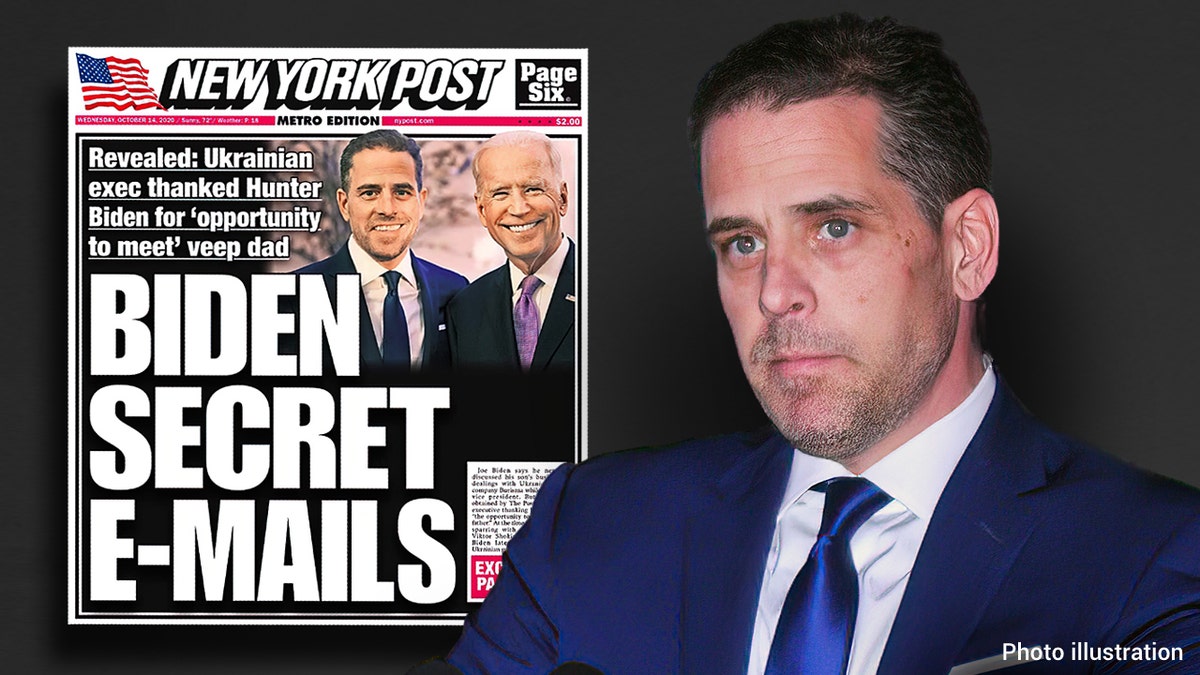
The New York Times on Wednesday subtly confirmed the Hunter Biden laptop story that was largely written off by mainstream news outlets as disinformation when the New York Post first reported it ahead of the 2020 presidential election and media watchdogs want to see the organizations that initially dismissed it correct their reporting. (Getty images | New York Post)
The report attempted to tie the New York Post's reporting to Russia by highlighting Giuliani's past interactions with Ukrainian lawmaker Andriy Derkach, who the U.S Treasury had sanctioned for being an "active Russian agent interfering in the 2020 campaign, which Derkach has denied."
It went on to claim the story "did not markedly advance what is already known about Hunter Biden’s foreign business dealings, other than to suggest that at one point he gave Vadym Pozharskyi, a Ukrainian business colleague, ‘an opportunity’ to meet his father. The Biden campaign said the vice president’s schedule indicated no such meeting."
The Post went on to note "intelligence experts" had expressed skepticism about it and that it was part of a "carefully planned information operation designed to affect an American election." That week, Politico published a piece headlined "Hunter Biden story is Russian disinfo, dozens of former intel officials say." Many of the signatories were Biden supporters and the piece admitted they had "no new evidence" to bolster their claim.
In a separate report published Oct. 14, 2020, the Post addressed Twitter and Facebook's suppression of the New York Post story, but merely described their actions as "unusual" and noted "Silicon Valley’s election preparedness" following the WikiLeaks dump of John Podesta's hacked emails during the 2016 election. It said that any outrage toward the Hunter Biden scandal was coming from the political right.
Washington Post fact-checker Glenn Kessler also authored a skeptical "explainer" of Hunter Biden's laptop.
Meanwhile, the paper published multiple opinion pieces urging readers to dismiss the controversy altogether.
On Oct. 15, 2020, Washington Post columnist Greg Sargent penned a piece declaring the scandal "fake" and "laughably weak," claiming, "While Trump and his propagandists would surely prefer to have a more compelling scandal to tout, the thinness of this new gruel is largely secondary."
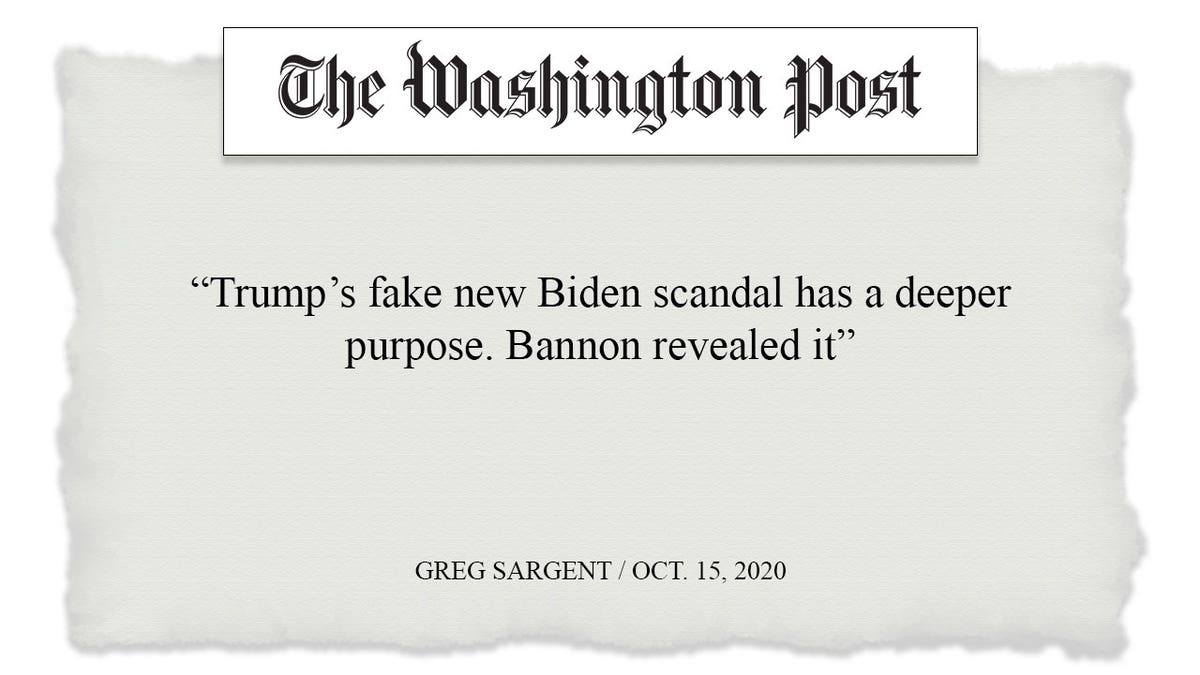
"There are all kinds of problems with the new allegations … the sourcing of the emails is hilariously suspect," Sargent wrote.
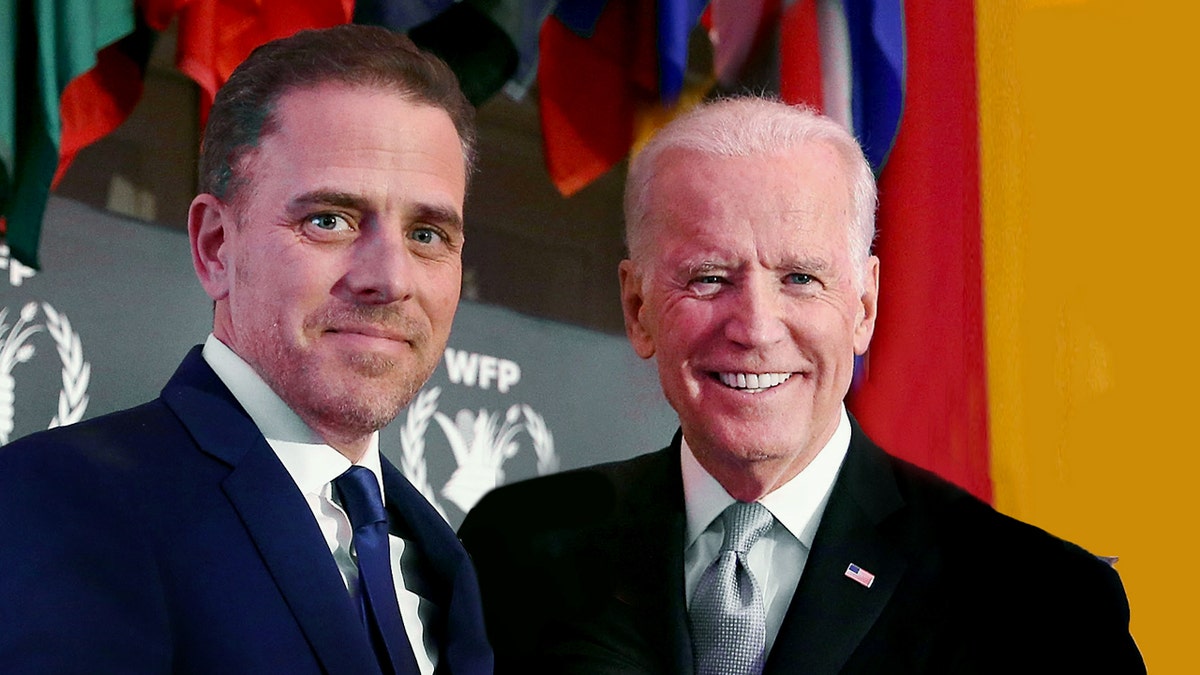
Hunter Biden and his father, Joe Biden. (Paul Morigi/Getty Images for World Food Program USA)
Sargent decried the media for giving any attention to the New York Post story at all, writing, "Trump’s last-ditch hope is to cast a vague pall of corruption over Biden. Lots of mainstream press stories about newly discovered laptops and secret emails and meetings between Biden family members and mysterious foreign influence peddlers might help spread that miasma — no matter how absurd or unsubstantiated the details, which few pay attention to" while acknowledging the coverage has been "sharply skeptical and lacerating."
The next day, Washington Post columnist David Ignatius penned a piece titled, "The truth behind the Hunter Biden non-scandal." He argued Hunter Biden’s ties to the Ukrainian gas company Burisma "isn’t a scandal about his father, as the Trump campaign claims, but part of a personal tragedy for the vice president’s son, compounded by this week’s dissemination of what looks like disinformation about Joe Biden’s role."
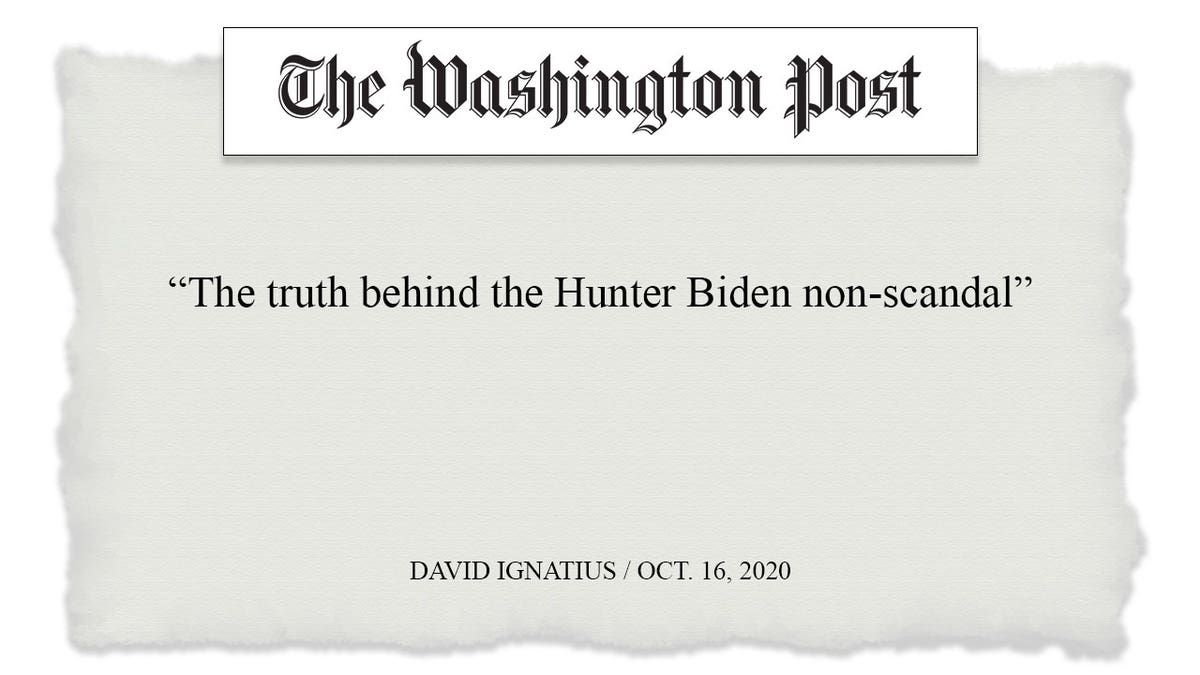
ABC, CBS, NBC IGNORE HUNTER BIDEN SCANDALS, HAVEN'T MENTIONED HIS NAME IN 259 DAYS, STUDY SAYS
Washington Post correspondent Philip Bump wrote an "analysis" on Oct. 22, 2020 mocking former Hunter Biden business partner Tony Bobulinski.
Bobulinski came forward to corroborate emails he was involved in and claimed he had met with Joe Biden pertaining to business dealings. He even insisted the "big guy" referred to in an email who was supposed to receive a financial kickback from a deal with a Chinese company was in fact the former VP.
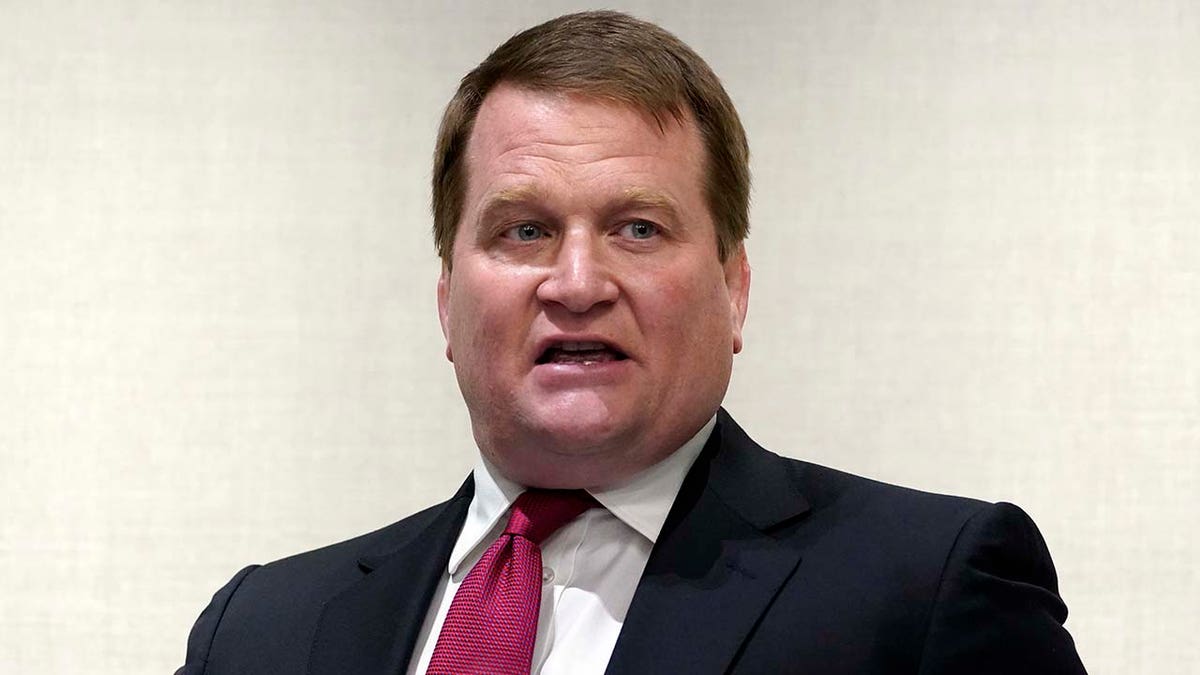
Tony Bobulinski, a former associate of Hunter Biden, talks with reporters before the presidential debate, Thursday, Oct. 22, 2020, in Nashville. (AP Photo/Evan Vucci)
"In some corners of the universe, it was a bombshell. President Trump would be bringing none other than Tony Bobulinski to the second and final presidential debate on Thursday night, a decision sure to shake the foundation of the presidential race. In most corners of the universe, though, the response was a bit different: Tony Who-now?" Bump wrote in his "analysis" piece. "There are two patterns that have so far defined Trump’s effort to win a second term. The first is that his campaign seizes upon particular themes and shakes them ferociously like a dog that’s nabbed a squirrel. The second is that these themes often overlap with the obsessions of conservative media, both because they often emerge from that world and because they often inform it."
Thomas Rid, author of "Active Measures: The Secret History of Disinformation and Political Warfare," wrote a "Perspective" piece published Oct. 26, 2020, just eight days before the presidential election, with the headline warning, "Insisting that the Hunter Biden laptop is fake is a trap. So is insisting that it’s real."
"Who is right? And how should the nation handle this leak and potential foreign interference at a critical time?" Rid asked. "A close look at the evidence shows that neither Biden nor Trump have the facts on their side for now. Take a step back, and the Russian interference of 2016 holds valuable lessons on what to do and what not to do in 2020: We must treat the Hunter Biden leaks as if they were a foreign intelligence operation — even if they probably aren’t."
CLICK HERE TO GET THE FOX NEWS APP
After touting the more than 50 former U.S. intel officials who claimed the Hunter Biden emails had the hallmarks of a "Russian disinformation" campaign, Sid told readers, "Indeed, there are good reasons to be skeptical of the theory that the laptop is a foreign plot … Nevertheless, in the likely continued absence of certainty either way, the Biden leaks deserve the full potential-disinformation treatment."













